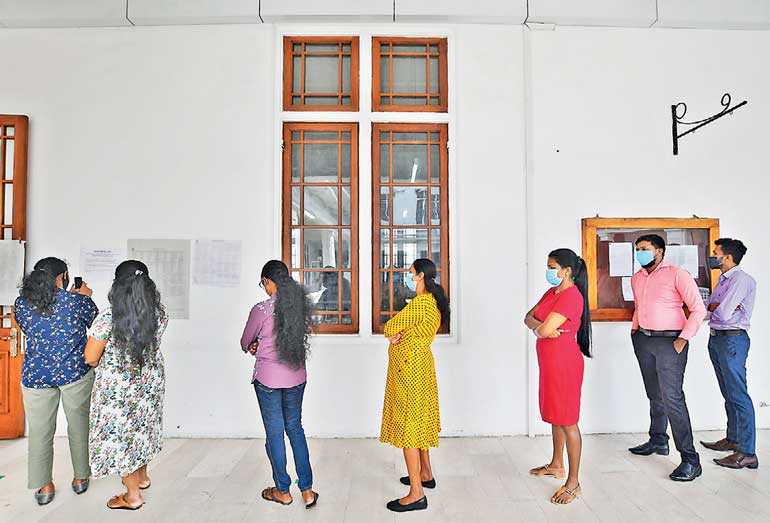Monday Feb 16, 2026
Monday Feb 16, 2026
Tuesday, 4 August 2020 00:20 - - {{hitsCtrl.values.hits}}

Why are we discussing the subject of a super majority when Parliament can pass legislation with a simple majority? Why should the Parliament we elect on 5 August be given a mandate to constrain all future parliaments? – Pic by Shehan Gunasekara
General, your tank is a powerful vehicle.
It smashes down forests and crushes a hundred men.
But it has one defect:
It needs a driver.
General, your bomber is powerful.
It flies faster than a storm and carries more than an elephant.
But it has one defect:
It needs a mechanic.
General, man is very useful.
He can fly and he can kill.
But he has one defect:
He can think.
– Bertolt Brecht
Poet and playwright Bertolt Brecht wrote this ‘General your tank’ poem when he was a refugee fleeing Nazi Germany moving from one land to another until he found sanctuary in America.
That man can think is something that those who wish to manipulate people often overlook.
Man can be manipulated to fly or kill. Since man can also think at some point, man will think about what is right and wrong. 
In this masterpiece of sardonic disdain for the dictator, Brecht informs the autocrat holding his country hostage that power can do many things, but it cannot make human intellect impotent.
The poem refers to types of machines and man conditioned to act as a supplement to the state machine. But at some point, man will abandon the futile pursuit and start thinking.
When will the Sri Lankan voter start thinking? Before or after 5 August?
Democracy
Democracy is not about voting. Voting is a mere mechanical function. It is not different from Brecht’s man operating the mindless, yet powerful tank in the service of a despot.
Democracy is much more. It is about freedom of speech, the separation of executive from legislative power, judicial independence, and political equality.
Flawed as it turned out to be, the 19th Amendment succeeded in setting up democratic institutions that prevented power from being centralised in arbitrary hands unaccountable to the people.
The idea of the republic was born out of the need to replace the king who ruled either by ‘divine right’ or ‘tribal tradition’. The idea of democracy was born to resist the tyranny of one despot or a despotic clique.
The mere pretence of an election is not democracy. We have all heard the old saying that absolute power corrupts absolutely. It does more than that. Absolute power tends to drive absolute power holder absolutely nuts.
Lord Acton credited with this original piece of wisdom followed it up with a further clarification. This is what he really said.
“Holders of power tend to demand more power. Power tends to corrupt and absolute power tends to corrupt absolutely. Great men are almost always bad men even when they use influence and not authority.”
That is the problem with concentrated power. In addition to authority it radiates a pervasive influence that lets lose underlings, flunkeys and hirelings who will form a subordinate constellation of repression.
The purpose of a republic is not to create or install an elected ‘king’. The purpose of a constitutional republic is to prevent power accumulating with either one person or a select few.
That is where the idea of checks and balances come in. It avoids extremism, instils the value of compromise and enshrines the necessity for deliberation.
A super majority
Why are we discussing the subject of a super majority when Parliament can pass legislation with a simple majority? Why should the Parliament we elect on 5 August be given a mandate to constrain all future parliaments?
A vote for a super majority at this election will make future voters – our children and grandchildren, powerless zombies.
A super majority will ensure a new ‘despotism’ more suffocating, more far-reaching than any we experienced since 1978 – the year the carnival of the dictator really took off.
It will be an orderly, disciplined, acquiescent form of peaceful slavery. We will enjoy perfect equality in our capacity to celebrate the hallucinatory wellbeing in an orderly state. The demand for a supermajority is cynical politics. Cynical politics cripples’ reason, common sense and basic ethics.
Outrage is understandable. Anger will make voters sit up and look for answers and solutions. Cynicism makes the voter reckless. Let us not be cynical on next Wednesday. Let us not make human intellect impotent next Wednesday.
This Parliamentary Election is about justice and fairness.
Have you noticed? We are a society deeply split on the meaning and purpose of the concept of justice.
A peaceful and prosperous nation
We have been promised ‘Vistas of Prosperity and Splendour’. That is all well and good.
A peaceful and prosperous nation requires good governance and a robust rule of law. The people need safety and security from violence in whatever form.
Their basic rights and fundamental freedoms must be protected. Society must ensure justice for all. Here lies the rub. What are the basic rights? Whose rights? What is freedom? Can the people defend their rights and freedoms from the justice system? These are questions for which we seem to have a wide variety of answers. When the system fails to provide credible answers to these questions, it means that the system is weak, fragile and inaccessible or accessible to a few and not to all. Rule of law presupposes the consent of all to abide by the law. When the law is imposed by those who rule, or when the law is forced on a society by ad hoc, provisional instruments of state, or when applied to those who have no power, it will not be perceived as legitimate, moral or just. A modern-day western legal philosopher John Rawls in his ‘Theory of Justice’ defined justice as fairness. His contemporary Amartya Sen the outstanding oriental philosophical mind rightly raised the question Fairness to whom? Determined by whom?
The ‘Idea of Justice’
In his phenomenal study – the ‘Idea of Justice’ Amartya Sen offers a classic parable that reflects the conundrum of justice and fairness.
Three children – Anne, Bob and Carla – are quarrelling over a flute. Anne claims the flute on the ground that she is the only one of the three who knows how to play the flute. Bob demands the flute on the basis that he is so poor that, unlike the other two, he has no other toys to play with and it would therefore mean a lot if the flute is given to him. Carla says that the flute belongs to her because she made it with her own labour.
None of the three claimants challenge the rival arguments. All three rely on their own persuasive logic.
Anne wants the flute because she is the only one who knows how to play it. Bob wants the flute because he is so poor that he has no toys to play with. Carla demands it because she made it. How do we decide between these three legitimate claims?
It is a question you can ponder over, on the way to the polling booth, wearing your face mask, observing social distancing.
Consider how you will resolve the riddle of the flute. One thing you can be certain of. To resolve it, you need a mind sensitive to the ethics of egalitarianism, libertarianism and utilitarianism. The utilitarian view would be to give it to the girl who will derive maximum pleasure out of it maximising utility. The egalitarian will give it to the poor boy because it addresses social gaps. The libertarian would give it to the girl who made it because she would naturally own it as the producer of the flute. There are different types of justice. Justice can decide who gets what, how different people are treated, what is right and wrong and restorative justice that makes amends. The one-dimensional military mind trained to view the world in terms of a hierarchical good order would not care who or plays the flute and long as it emits the tune it wants to hear.
Morality is larger than the debate on justice. Do not use your ‘bugle’ – your ‘franchise’ – to play the ‘last post’ – for freedom.